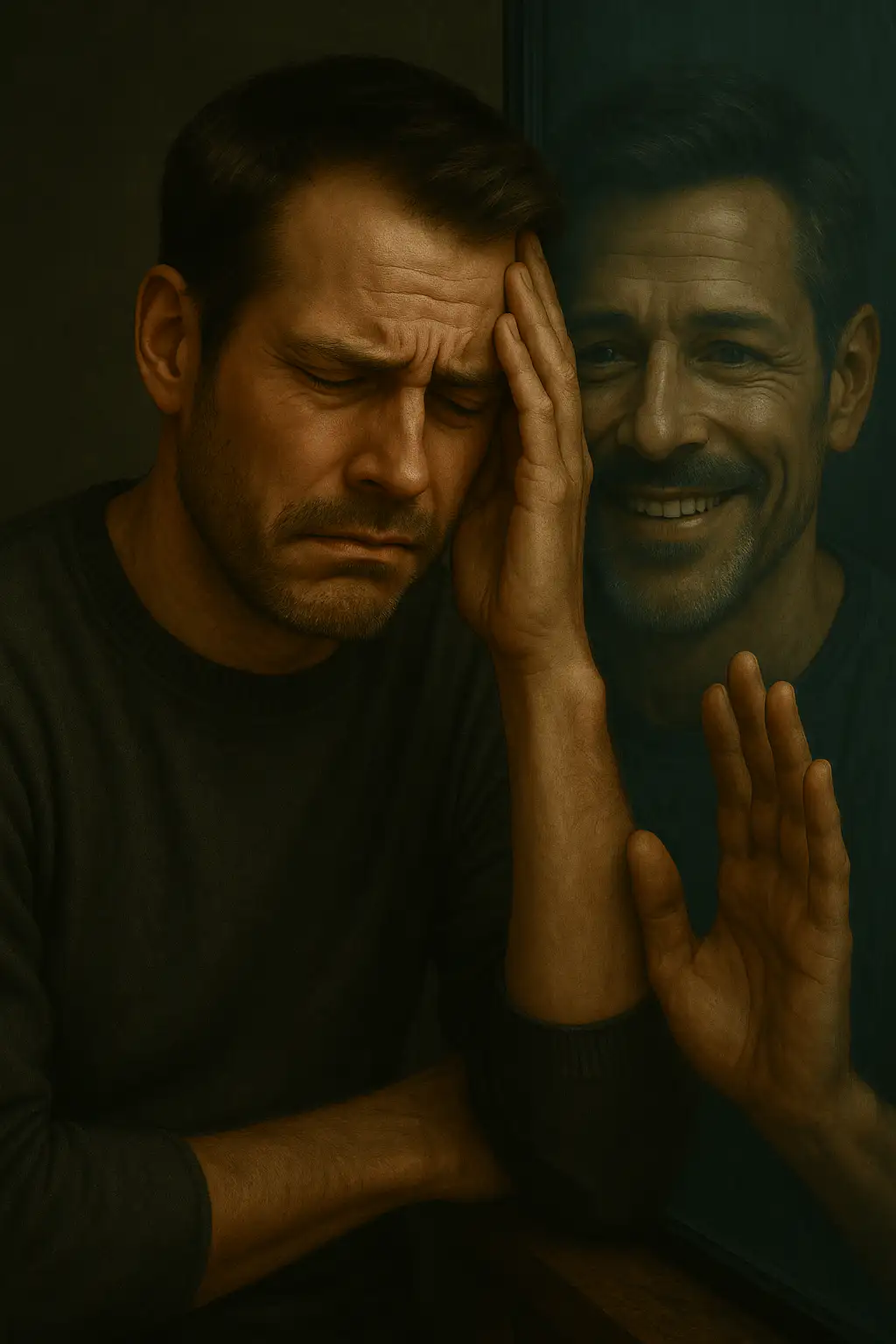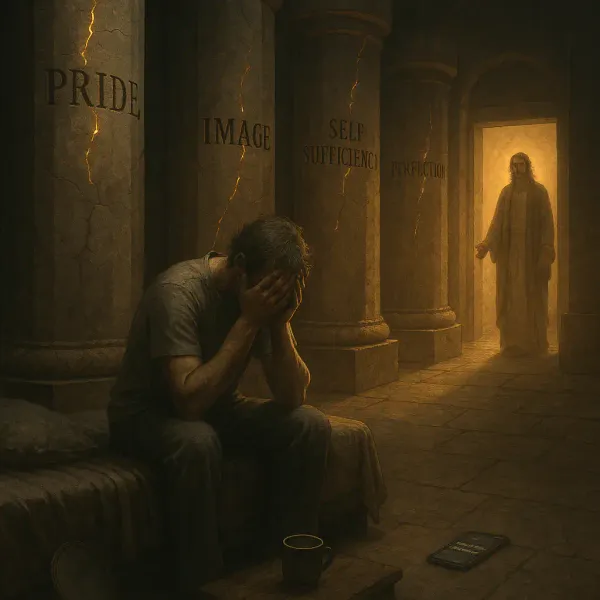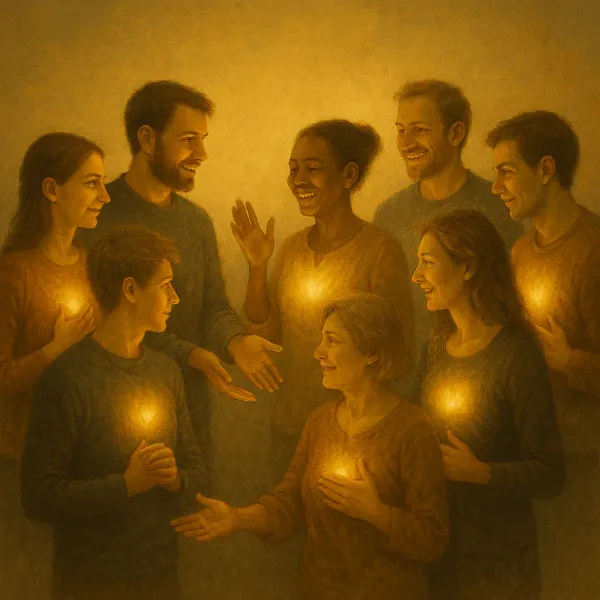The Journey Between Two Minds
You feel it: two minds at war. One defends, performs, controls. The other surrenders. One is fuelled by the feed. The other washed by the Word. This isn’t self-improvement. It’s replacement. One mind must die. The other leads to life. Step into the journey between them.

There are two minds in me.
Not metaphor.
Not allegory.
Reality.
One is quick to justify, slow to listen, fast to speak. It scans for threat, for approval, for a sense of control. It remembers slights easily but forgets grace like a dream. It has a well-reasoned explanation for every defence, every impulse. It forms opinions like breath, and baptises them in “what I’ve been through.” This mind doesn’t want Christ to reign—it wants Christ to endorse.
Scripture names this not a wound or a shadow, but the flesh. A belief system built from rebellion, hostility, existential unbelief, fear, offence, unforgiveness, resentment, pain, pride, patterns, family scripts, cultural liturgies and inherited fears.
“The mind set on the flesh is death, but the mind set on the Spirit is life and peace.”
—Romans 8:6
And the apostles—who lived closer to resurrection fire than we often dare—spoke plainly:
This flesh, with its networks of meaning, cannot be reformed.
It cannot be educated into obedience.
It cannot be healed into holiness.
It must die.
Because the flesh is not just weakness.
It is rebellion baptised in memory.
A mind built from trauma, tribalism, self-trust and inherited grievance—a belief system that makes perfect sense to itself, but is at enmity with God.
It does not need therapy. It needs crucifixion.
“The mind set on the flesh is death… it is not even able to submit.”
—Romans 8:6–7
This is the apostolic word: sin is not merely what we do.
It is what we are, apart from Christ.
It is a law at work in our members (Romans 7), a domain under which we once lived (Colossians 1:13), a condition in which we are born (Ephesians 2:3)—and it cannot be appeased, reasoned with, or managed.
Sin is not error—it is enmity.
Not ignorance—but identity.
And the flesh is its priest, speaking in defence of our broken autonomy, always telling us:
“You’re not that bad.
You’re getting better.
Just try harder.”
But Paul—who once tried harder than anyone—says no.
The gospel is not a gentle correction to a mostly good heart.
It is a death sentence to the false self.
I used to think the gospel was a belief adjustment.
That repentance was rethinking my behaviour.
That sanctification was me, just improved—morally sanded down, a bit more patient, a bit less proud.
But the longer I walk, the more I see:
This is not renovation. It is resurrection.
This isn’t about self-improvement.
This is about replacement.
Not a better me.
A buried me.
And something altogether new, born of the Spirit, rising in its place.
“If anyone is in Christ, he is a new creature; the old things passed away; behold, new things have come.”
—2 Corinthians 5:17
But here’s where it gets harder—the old things still speak. And in this algorithmic age, they don’t just whisper in temptation. They broadcast.
Every scroll affirms the flesh: you are what you desire, what you fear, what you can prove.
Every “feed” fuels the first mind—offering content, not communion; spectacle, not sanctification.
And facts—no matter how well-argued—cannot free us.
Because the flesh is not a logic problem.
It is a false self, embedded in a false structure, that must be crucified.
Another Mind
But there is another mind.
Slower. Still. Submissive.
Not reactive, but responsive.
This is not the smarter mind.
It is the surrendered one.
“We have the mind of Christ.”
—1 Corinthians 2:16
I’ve tasted it—mostly in weakness.
Not when I’ve triumphed, but when I’ve let go.
Not when I argued rightly, but when I repented quietly.
I’ve met this mind at tables where no one was impressive, but everyone was seen.
In communion—not content.
In correction—not cancelation.
In the body—not the brand.
Many times, sitting in a circle of believers, tired from a long week, no leader performing, no algorithm curating, just bodies present. We shared bread, not strategy. Someone wept. Another didn’t speak. I confessed a hidden resentment that had been chewing my soul like rot. And no one fixed me. We communed together in our weakness.
That’s where the mind of Christ shows up. Not in the feed, but in the fire.
Not in control, but in cruciform communion.
That’s when the Word doesn’t just teach me—it washes me.
“Be transformed by the renewing of your mind.”
—Romans 12:2
“So that He might sanctify her, having cleansed her by the washing of water with the word.”
—Ephesians 5:26
This is not moral hygiene.
This is soul surgery.
Done not in isolation, but in church.
Not the performance halls of modern Christianity, but in the gritty, frustrating, beautiful local gatherings of saints, with elders who rebuke in love and saints who don’t flinch when you bleed.
The journey from Carnal to Spiritual
So I walk.
Between two minds.
One defended by the flesh, fed by the feed.
One crucified with Christ, nourished by Word, presence, and shared correction.
I confess: I fall back into the old mind often.
It feels safer. More familiar.
But it never brings peace. Only opinion, pain.
Never communion. Only control.
The new mind? It is harder.
It breaks me open. But it births something alive.
A Closing Reflection: From Self to Sonship
If I’m honest, I want transformation without tension.
Resurrection without crucifixion.
Glory without staying.
But the apostles knew better.
“We all… are being transformed into the same image from glory to glory.” —2 Corinthians 3:18
This is not a sprint.
It is a long obedience in the same direction.
A becoming that must be guarded, tended, committed to—in the local church, built on apostolic foundations, through correction and communion, until Christ is formed in us.
Not everyone wants this.
But some do.
Some are tired of content without communion.
Facts without freedom.
Performance without presence.
To those ones, I say:
Let’s walk together.
Not as branded Christians.
But as becoming ones.
There are two minds.
But only one leads to life.
Let’s set ours there.



